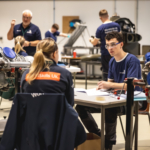The waiting is almost over: we are now only days away from the skills Olympics! Two years of training, preparation and sheer dedication have led 37 young women and men from across England, Scotland, Wales and Northern Ireland – Team UK – to this incredibly exciting moment. It is a huge privilege for all of us who work with this team, their training managers, coaches, employers, FE colleges and training providers, to share with them this special moment in all their lives. What awaits them in Kazan, Russia, is an experience like no other. Over 1,000 young people representing teams drawn from major countries all round the world – the USA, France, Germany, Brazil, South Korea, Japan, China and others – competing against one another for the right to be called the very best across the full breadth of technical skills that the global economy needs now and in the future.
For the UK, with the Prime Minister’s Brexit countdown clock ticking down, this is the most important skills Olympics we have participated in across our over 65 years of involvement in the competition. It’s the ultimate test of where our young people are at benchmarked against the highest world-class standards: how we fare in Kazan will provide vital lessons which we can use upon our return home to strengthen the economy and close skills gaps wherever they exist. So here are three key themes we will be focusing on for our skills Olympics journey.
The first is performance. We’ve a proud record of punching above our weight in international skills competitions: for the past 10 years we have maintained a top 10 ranking at both European and global events. Our goal this month is to do it again. But this will not be a straightforward ambition. We will be facing teams with far greater resources than ourselves, with competitors who are heavily incentivised to deliver medal-winning performances or those who will have spent two years solely preparing for the competition. While others, like our own, will have had to balance work and training commitments alongside their preparations for the event. I’m backing Team UK because I believe our training methods have helped better prepare them to deliver and because I know how talented each of them are and how hard they have trained to be able to compete at this level. They will demonstrate the UK can produce a world class skills performance, thereby inspiring the next generation of young people to follow in their footsteps and crush any misguided perceptions that following a technical career route is a second-class option.
The second is productivity – with the centrepiece being the recent launch of our Productivity Lab. Our participation in the skills Olympics is going to be a critical opportunity to further hone and refine our approaches to using competition activity to help reduce the productivity gap in our economy. Part of this is about mainstreaming the training methods Team UK use to compete internationally across UK skills systems to boost standards. And for the first time at this skills Olympics we will be accompanied at the event by a delegation of leaders from the construction industry who will be using the international platform as a “seeing is believing” opportunity to explore some of the most pressing skills gaps and standards questions facing the UK construction industry today with the aim of bringing those insights to help inform industry thinking and practice about the future.
The third is diversity: I want our participation in the skills Olympics to be a catalyst for change. In future years, we need to ensure that the young people who represent the country at these major international events have reached the Team following a fully inclusive selection and training process so we can be sure we have the best possible team, with its performance founded on its diversity and acting as inspirational role models for the next generation. That’s why we will be launching in the autumn a new report with colleagues at The Social Innovation Partnership examining in detail the challenges and opportunities we face to help ensure our skills competitions are as inclusive as possible. This is so that as many more young people, from all walks of life, get the opportunities our work brings to help develop their technical skills, their confidence and their resilience helping them get the best start in work and life.
So as we approach the competition in the coming days I’m very clear that performance is paramount to the success of our participation. Team UK is going for gold and we have 37 proud ambassadors flying the flag for Global Britain. But beyond medals, our journey to Russia can be the catalyst for so much more positive change that we can bring back and mainstream into skills systems across England, Scotland, Wales and Northern Ireland. Whether that’s shifting people’s perceptions of apprenticeships and technical careers, boosting productivity or changing approaches to diversity and inclusion – all of this flows from the vista that a global event like WorldSkills Kazan affords. Go Team UK!


